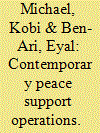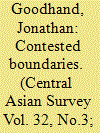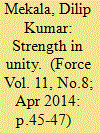|
|
|
Sort Order |
|
|
|
Items / Page
|
|
|
|
|
|
|
| Srl | Item |
| 1 |
ID:
140767


|
|
|
|
|
| Summary/Abstract |
The role of small states in international relations, aspiring to enter into international society as a credible actor, is often measured through their contribution to international security. Slovenia, as a small state, has presumed its ‘well-deserved place’ in the international community could be reached by becoming a trustworthy member of NATO. Among other things, this has meant aligning state policies with those of the political-military organization and so becoming a ‘like-minded’ member of the prestigious club. One of the steps Slovenia has done in this regard was the deployment of its civilian experts to the NATO-led missions to Kosovo and Afghanistan; they were integrated into the contingents of the Slovenian Armed Forces. With this, Slovenian civil-military cooperation in conflict and post-conflict areas has begun, following NATO’s request to contribute not only armed forces but also civilian experts. This article analyzes the development of civil-military cooperation in Slovenia and explores how has it evolved from relatively poorly planned and unorganized attempts to a more structured and better coordinated ‘business’ of a small state in fragile societies. The relationship between the Slovenian military and Slovenian civilian experts from the perspective of ‘being forced to work together’ within the stabilization efforts in Kosovo and Afghanistan is the main focus of this article. The article’s findings, built on interviewing and surveying of Slovenian military commanders and civilian experts, are relevant for a better understanding of small states’ behavior in international relations and military sociology in conflict and post-conflict zones.
|
|
|
|
|
|
|
|
|
|
|
|
|
|
|
|
| 2 |
ID:
107666


|
|
|
|
|
| Publication |
2011.
|
| Summary/Abstract |
In this article the authors examine two set of issues that constrain contemporary peace support operations (PSOs): one centered on the kinds of knowledge prevalent in PSOs and the second involving the organizational structures that characterize them. The authors' aim is to show the deep discursive and structural limitations and contradictions that continue to characterize the actions of armed forces and the dominance of militaristic thinking within PSOs. This article centers on multidimensional peacekeeping marked by emphasizing two main points in regard to the complex nature of such peacekeeping. First, Western military thinking is still dominant in the professional discourse of peacekeeping despite the fact that in many cases it is less relevant to the arenas where it is applied (in weakened or failed states). Second, forces in second-generation peacekeeping missions are by definition a form of hybrid organizations, and therefore conceptual changes in regard to PSOs not only involve the realm of knowledge but also entail practical consequences for the very organizational means used to achieve their aims. The authors' analysis demonstrates the blending, hybridization, and linkages that are an essential part of PSOs as processes that carry both advantages and disadvantages for organizational action.
|
|
|
|
|
|
|
|
|
|
|
|
|
|
|
|
| 3 |
ID:
124148


|
|
|
|
|
| Publication |
2013.
|
| Summary/Abstract |
In recent years there has been a growing focus in academic and policy circles on the changing roles of military and civilian actors in the context of multi-mandate peace and stabilization operations. This focus on 'civil-military cooperation' (CIMIC) and the related notion of the 'security-development nexus' reflect changed thinking about the causes of (and solutions to) to wars and insecurity, the role of external actors, and the balance between 'hard' and 'soft' forms of intervention. This article explores the civil-military interface in Afghanistan, focusing on the changing role of NGOs and specifically their growing but troubled relationship with externally promoted statebuilding and counterinsurgency. A recurring theme in the article is that of contested boundaries; CIMIC has been the site of intensive 'boundary work' in which NGOs and the military seek to negotiate or contest where boundaries are drawn and who has the power to draw (and police) them.
|
|
|
|
|
|
|
|
|
|
|
|
|
|
|
|
| 4 |
ID:
085675


|
|
|
|
|
| Publication |
2008.
|
| Summary/Abstract |
Civil-military coordination between missions with the same top end of command and belonging to the same organization should increase the effectiveness of both missions even more than in a traditional interaction between military and civilian organizations. Nevertheless, the two EU missions in Bosnia, EUPM and EUFOR, which were both engaged in the fight against organized crime, had to undergo a difficult process until a decent level of cooperation was achieved. The article tries to describe the problems encountered and to address key factors, such as different concepts of operation, problems in the chain of command, a lack of accountability and-most importantly-the human factor, that hampered this cooperation.
|
|
|
|
|
|
|
|
|
|
|
|
|
|
|
|
| 5 |
ID:
133805


|
|
|
|
|
| Publication |
2014.
|
| Summary/Abstract |
An examination of how the First World War disrupted civilian life, the forms of violence perpetrated against civilians during the conflict, and the role of conscription in creating new hierarchies that privileged ideals of male 'warrior'
The First World War radically changed the relationship between war and civilians, in terms of altered expectations of conflict, the dismantling of the pre-war distinction between combatant and civilian, and the glorification of the soldier as the ideal citizen. Heather Jones asks why the war has been remembered as a 'soldiers' war', exploring how the war disrupted civilian life, the forms of violence perpetrated against civilians during the conflict, and the role of conscription in creating new hierarchies that privileged ideals of male 'warrior', rather than civilian, citizenship.
|
|
|
|
|
|
|
|
|
|
|
|
|
|
|
|
| 6 |
ID:
137889


|
|
|
|
|
| Summary/Abstract |
In this age of advanced technology, it’s simply incomprehensible that the ill-fated Malaysian airline MH 370 with 239 passengers disappeared so easily. And it took the Malaysian authorities nearly two weeks to announce that the plane had crashed into the southern Indian Ocean. As now the search operations re-focus on the southern part of the Indian Ocean to locate the debris, there is anger and accusations directed against the Malaysian government.
|
|
|
|
|
|
|
|
|
|
|
|
|
|
|
|
| 7 |
ID:
120309


|
|
|
|
|
| Publication |
2013.
|
| Summary/Abstract |
Private military and security companies' (PMSCs) relationship with state actors has received significant scholarly attention; their interaction with other private actors such as humanitarian non-governmental organisations (NGOs) has remained largely neglected. This article looks at the evolving relationship between NGOs and PMSCs in three parts. First, it assesses the current state of NGO-PMSC interaction. Two aspects stand out: contracting and conflict. By drawing on existing research on different forms of inter-cultural cooperation such as military-military and humanitarian-military cooperation, the second part of the article will show that conflict between PMSCs and NGOs can inter alia arise from their differing backgrounds, mandates, approaches to security, and short- and long-term goals. By looking at both differences and similarities between the two actors, the third part of the article will sketch out possible pathways for the future.
|
|
|
|
|
|
|
|
|
|
|
|
|
|
|
|
|
|
|
|
|